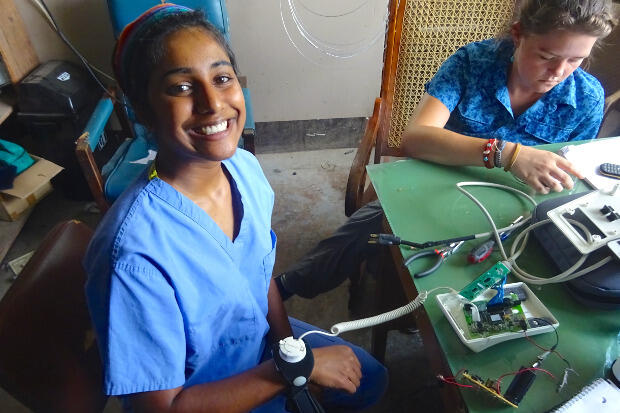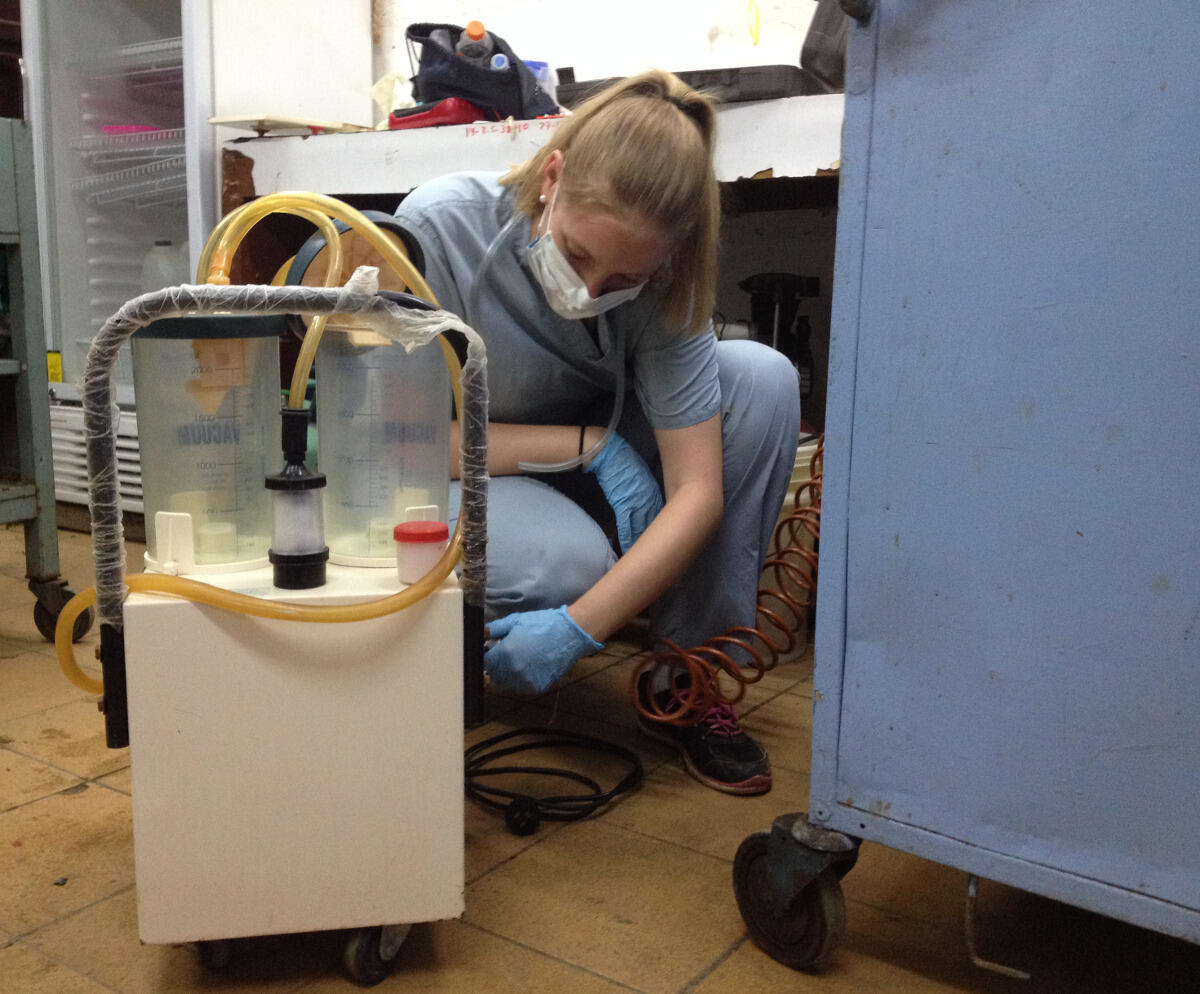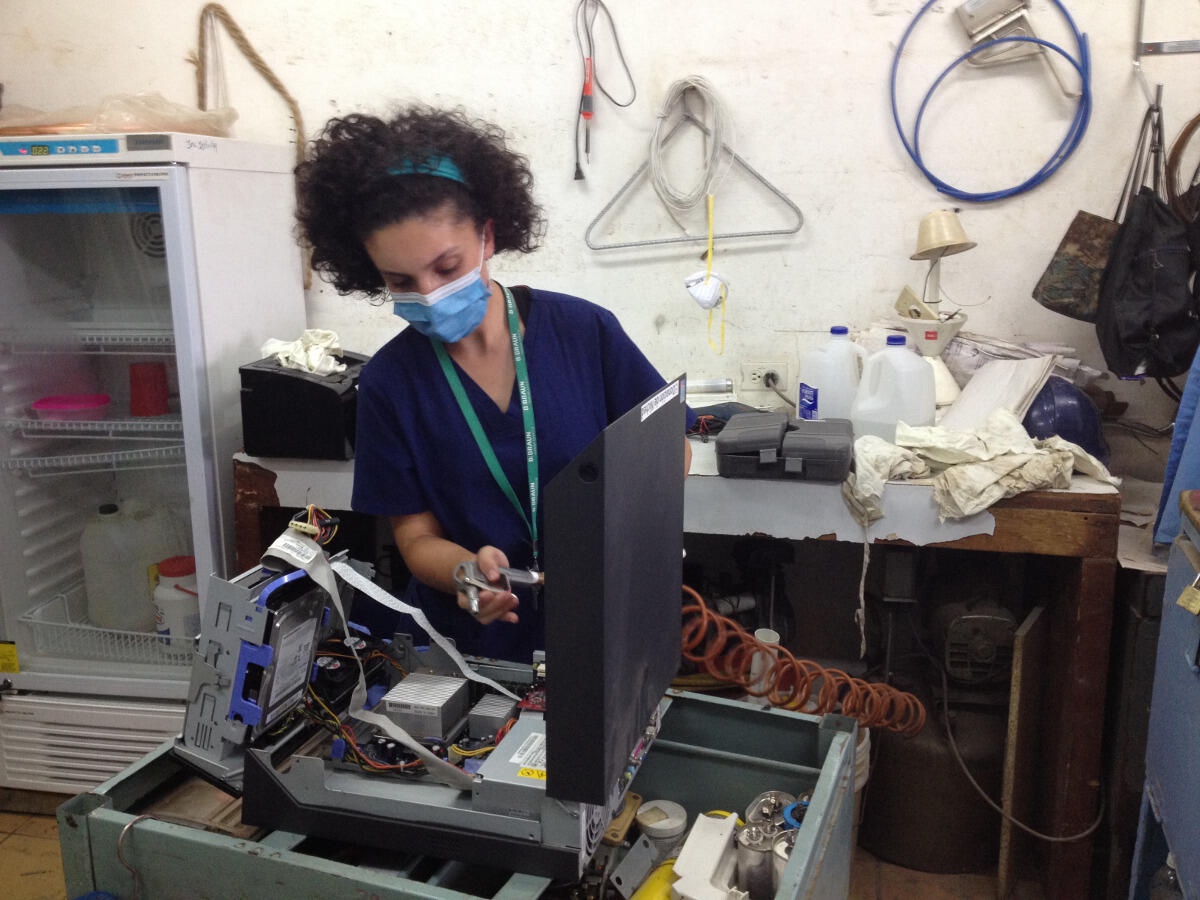
Sept. 17, 2015
Biomedical engineering students repair medical equipment in developing countries’ hospitals
Share this story
Tiffany Wong, a senior biomedical engineering major at Virginia Commonwealth University, spent much of her summer working in hospitals in Rwanda, helping to fix up aging and broken medical equipment.
“We performed a plethora of tasks, including fixing medical and lab equipment — nebulizers, aspirators, oxygen concentrators, centrifuges — and performed preventative maintenance on other equipment,” said Wong, a student in the School of Engineering. “We also had [non-biomedical engineering] related fixes; my technician was gone a whole week because of training and we had to power the generator, change the lock of a locked room and save a person from a closed elevator.”
Wong was among seven VCU engineering students who spent the summer in hospitals in developing countries to repair medical equipment.
Five of the students, including Wong, were taking part in the Engineering World Health Institute, a program that aims to improve health care in developing countries and to provide students with the opportunity to gain real-world experience with industrial design, social entrepreneurship, business planning and global ethics.
Christopher Lemmon, Ph.D., an assistant professor in the Department of Biomedical Engineering, said the Engineering World Health Summer Institute provided students with a life-changing experience. Lemmon and Russell Jamison, Ph.D., a professor in the Department of Biomedical Engineering and the Department of Chemical and Life Sciences Engineering, serve as faculty advisers for Engineering World Health at VCU.
“These students are traveling to developing nations, being exposed to new cultures, learning new languages and being introduced to an environment that most people never see. On top of that, they’re getting a hands-on, real-world experience in engineering that transcends anything that they do in the classroom,” Lemmon said. “They also get to see a philanthropic side of engineering that they would not otherwise be exposed to; instead of the corporate side of engineering a new product or device, they’re engineering equipment that has an immediate, direct and powerful impact on human lives.”
They also get to see a philanthropic side of engineering that they would not otherwise be exposed to.
Two of the students, Megan Lavery and Brittany Allen, traveled to St. Vincent and the Grenadines to repair medical equipment as part of an independent study project organized by Jamison, with planning assistance from the nonprofit World Pediatric Project. Lavery and Allen worked with a staff of maintenance technicians at the island nation’s main hospital, Milton Cato Memorial General Hospital in Kingstown, St. Vincent, as well as at smaller clinics in more rural areas.
“We repaired a lot of nebulizers in particular,” said Allen, a senior biomedical engineering major. “A lot of the work that we did was preventative maintenance, such as cleaning out autoclaves to improve their function and prolong the machine’s usability lifespan, but we also made a lot of repairs to equipment that was then returned to use in the hospitals or clinics.”
Lavery and Allen also were tasked with brainstorming ideas for improving and innovating designs of medical equipment that would help improve medical care in developing nations.
“We identified a need for a low-cost, portable infant warmer that could be used to keep premature babies warm during transport from the Grenadines islands to the hospital on the mainland — a trip that can take hours by boat if the family cannot afford to fly,” Allen said. “We were able to find a product already available on the market, the Embrace Infant Warmer, which perfectly addresses all of the hospital’s needs and through our contacts at World Pediatric Project, we have set in motion the process of getting these infant warmers to Milton Cato Hospital and the clinics in St. Vincent.”

The students came up with several other “pretty cool design ideas” that they intend to pitch to Jamison’s Biomedical Engineering Design Practicum class so that groups of students can choose to work on them and design solutions to the problems.
Three of the students, Anisa Kannan, a senior biomedical engineering major; Veronica Peterkin, a senior majoring in biomedical engineering and mathematical sciences; and Sindora Baddam, a senior biomedical engineering major, worked in hospitals and clinics in Nicaragua.
“We were working on anything from autoclaves to electrocardiograph machines to suction pumps,” Kannan said. “Oftentimes, we were only cleaning them for preventative maintenance, but sometimes things broke that we would have to solder back together or find another innovative solution.”
Sometimes things broke that we would have to solder back together or find another innovative solution.
Kannan said she felt like she was making a difference, while also getting to experience life in a different country.
“That brought me a lot of new perspectives on things, like air conditioning,” she said. “We were able to meet new people, learn a new language and help out in a hospital in a developing country.”
Kannan added that the experience gave her a new perspective on health care, both in the United States and in developing countries.
“We had a small stipend that we were able to buy a few replacement parts with, but you can only do small fixes on the same things over and over again so many times; eventually you need a new part,” she said. “It’s hard to wrap my mind around the fact that a part that maybe costs $500 to give them a working machine again is too expensive. In the United States, that would be nothing for a hospital to pay for a replacement part.”

For the first month, the students took classes in Spanish and engineering in Grenada, and were split into teams for the second month and sent to various locations around Nicaragua.
As part of the institute, the students also had to create a secondary project, addressing a health care need in developing countries.
Wong’s team made an equipment maintenance request form that was powered by Google.
“The information from each request would be stored in an Excel sheet and can be organized by department, criticality, center/hospital and date,” she said. “We presented our secondary project to the hospital staff, and ideally, the software would be implemented throughout the hospital and will have benefits such as increasing the speed of equipment delivery, bringing the necessary tools to the health centers, and documentation of repairs for the Ministry of Health.”
Baddam said her time working in Nicaragua was a life-changing experience.
“Everyone had so much energy and was super motivated and passionate about [what] they’ve done and are currently doing,” she said. “Everyone’s motivation drove each other to work hard and learn a lot in so many aspects. Not just my peers, but the technicians I had the opportunity to work with may not have been the best, but the way they used their limited resources to come up with so many handy fixes were so innovative. This experience is something I am really grateful to have had.”
Subscribe to the weekly VCU News email newsletter at http://newsletter.news.vcu.
Subscribe to VCU News
Subscribe to VCU News at newsletter.vcu.edu and receive a selection of stories, videos, photos, news clips and event listings in your inbox.












